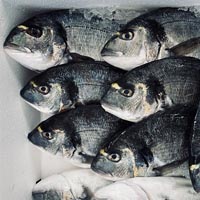Medicinal herbs: The missing link to sustainable aquaculture

Submitted: 4 November 2021
Accepted: 21 November 2021
Published: 6 December 2021
Accepted: 21 November 2021
Abstract Views: 970
PDF: 265
Publisher's note
All claims expressed in this article are solely those of the authors and do not necessarily represent those of their affiliated organizations, or those of the publisher, the editors and the reviewers. Any product that may be evaluated in this article or claim that may be made by its manufacturer is not guaranteed or endorsed by the publisher.
All claims expressed in this article are solely those of the authors and do not necessarily represent those of their affiliated organizations, or those of the publisher, the editors and the reviewers. Any product that may be evaluated in this article or claim that may be made by its manufacturer is not guaranteed or endorsed by the publisher.
Similar Articles
- Victorien Dougnon, Phénix Assogba, Hornel Koudokpon, Césaire Ayena, Sosthéne Vissoh, Géraldine Akpaka, Jean Robert Klotoe, Lamine Baba-Moussa, Honoré Bankole , Koffi Koudouvo, Jacques Dougnon, Treatment of urinary tract infections with medicinal plants: Monographs of some plants species revealed by traditherapists , Infectious Diseases and Herbal Medicine: Vol. 1 (2020)
- Shafiul Azam Zishan, Md. Ishtiaque Uddin, Jannatul Naima, Sadab Ibban, Conventional medicines used for kidney protection in Bangladesh: a review , Infectious Diseases and Herbal Medicine: Vol. 4 (2023)
- Ghazal Rahimzadeh, Abdullatif Tay, Joe Mac Regenstein, Asad Rokhzadi, Hossein Dabiri, Evaluation of microbial and sensory properties of flavored yogurt drink produced by Noaea mucronata and liquid smoke treatment , Infectious Diseases and Herbal Medicine: Vol. 1 (2020)
- Dronesh Chettri, Current status and future challenges of avian influenza – a literature review , Infectious Diseases and Herbal Medicine: Vol. 5 (2024)
- Dr. Dronesh Chettri, The emergence of Monkeypox Virus: its complications, connection with smallpox and its future aspects - a short review , Infectious Diseases and Herbal Medicine: Vol. 5 (2024)
- Shah Mohammad Abbas Waseem, Syed Haider Husaini Mehdi, Novel Coronavirus disease (COVID-19): physiology to pathophysiology and therapeutics including herbal medicines , Infectious Diseases and Herbal Medicine: Vol. 4 (2023)
- Siukan Law, Licorice and its applications for SARS-CoV-2 , Infectious Diseases and Herbal Medicine: Vol. 3 (2022)
- Siukan Law, Albert Wingnang Leung, Chuanshan Xu, Could Scutellaria barbata D. Don be used for treating lung cancer and SARS-CoV-2? , Infectious Diseases and Herbal Medicine: Vol. 2 (2021)
- Siukan Law, Albert Wingnang Leung, Chuanshan Xu, Usage of Oldenlandia diffusa for skin diseases and skin-care , Infectious Diseases and Herbal Medicine: Vol. 1 (2020)
- Bernard K. Turkson, Desmond Nkrumah, Reinhard Isaac Nketia, Alfred Ofori Agyemang, Isaac Kingsley Amponsah, Burnett Tetteh Accam, Merlin L.K. Mensah, Yvonne Boateng, Antimicrobial activity, toxicity and retrospective clinical effectiveness of Kantinka BA and Kantinka Herbaltics, two multi-component-herbal products used in the management of infectious diseases in Ghana , Infectious Diseases and Herbal Medicine: Vol. 5 (2024)
You may also start an advanced similarity search for this article.

 https://doi.org/10.4081/idhm.2021.171
https://doi.org/10.4081/idhm.2021.171



